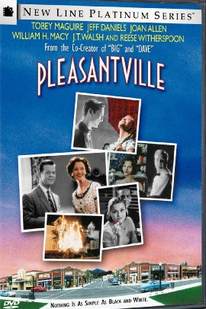Battling the guardians of the forbidden fruit (9/10)
 A fascinating exploration of moral choices: the comforts of social conformity vs. the wild ride of personal liberation. Pleasantville is a movie I hadn’t seen in a while, then loading it into the DVD player I realize it’s been almost 10 years (1998) since it came to the screen. Seems like yesterday. For some reason—perhaps seven years of a full-frontal, faith-based political regime—the film deeply moves me now.
A fascinating exploration of moral choices: the comforts of social conformity vs. the wild ride of personal liberation. Pleasantville is a movie I hadn’t seen in a while, then loading it into the DVD player I realize it’s been almost 10 years (1998) since it came to the screen. Seems like yesterday. For some reason—perhaps seven years of a full-frontal, faith-based political regime—the film deeply moves me now.
The theme is as timeless as the central issue posed by those hysterical autocrats who pontificate(d) the Old Testament: do I accept or defy God? And if I decide to leave my warm family home on Superstition Mountain, am I prepared to accept the consequences?
Tobey Maguire … David
Reese Witherspoon … Jennifer
William H. Macy … George Parker
Joan Allen … Betty Parker
Jeff Daniels … Bill Johnson
J.T. Walsh … Big Bob
Don Knotts … TV Repairman
Paul Walker … Skip Martin
Marley Shelton … Margaret Henderson
Jane Kaczmarek … David’s Mom
The movie begins in contemporary Southern California following the young lives of David (Tobey Maguire) and Jennifer (Reese Witherspoon). Jennifer is the Valley Girl wannabe-slut in training and David her perfect complement: a nerd expert on a Leave-It-To-Beaver lookalike program, Pleasantville. The kids live in a broken home, with their single mother (Jane Kaczmarek).
Tonight is a big night for the kids: Mom is going out for a long evening (it turns out with some sleazeball who only wants one thing) and Jennifer has arranged for the school bad boy to drop by for some things of her own. David has been training for the all-night Pleasantville Marathon, a trivia contest, and plans on having the TV to himself. Jennifer wants to use the TV as mood intro for her date. They battle over the remote and it breaks.
Just at that moment an unusual—”We’ll Fix You for Good!”—TV repairman (Don Knotts) knocks on the door and asks if they need any help with their system. A bit astonished by his timely presence, they let him in. He gives them a remote control with more “oomph.” David turns on the Marathon, which is just starting, and Jennifer resumes fighting him for the remote. Someone presses the wrong button and swoosh, David and Jennifer wind up as Bud and Mary Sue Parker in the black-and-white world of Pleasantville, 1958.
Then the fun really begins.
Bud (David) and Mary Sue (Jennifer) soon become resigned to their situation, with Bud understanding more than Mary Sue how delicate this new (seemingly perfect and sexless) world is. He insists she do nothing to scare the natives with radical ideas like 90s slang, coming on to the high school hero Skip (Paul Walker) at Lovers’ Lane, or making fun of these total squares.
One hilarious scene after another shows the square-perfect reality: a) every player on the basketball team swishes every shot, b) the firemen rescue cats in the blink of an eye, but have no idea what a fire is, c) the men of the town bowl every week and either make strikes or pick up 7-10 splits d) there aren’t any toilets in the girls’ bathrooms or words in any of the library’s books, and e) soda shop owner Bill Johnson (Jeff Daniels) doesn’t know what to do if Bud doesn’t show up for work.
Like Eve giving up the apple to Adam, sex is what starts to unravel this 50s fantasy island in short order. First the teenagers, imitating Mary Sue’s salacious Lovers’ Lane behavior, start changing from black and white to color. Skip sees a red rose, a girl blows a pink bubble-gum bubble, one girl’s tongue turns red—the doctor tells her to lay off greasy foods and chocolate—, a boy’s bright light-green Thunderbird convertible is parked outside the soda shop, and so on.
Soon the town is populated by hot “colored” teenagers necking and petting, rock and roll music, and people doing what they’ve always wanted to do. For example, Bill Johnson the soda shop owner loves to paint, and he realizes just as Betty Parker does, that the two of them are passionately in love with each other. The liberation of Pleasantville quickly presents real challenges to the old “non-changeist” life of the black-and-white society:
The basketball team begins to lose games, the bowlers don’t make strikes, women aren’t keeping house, the books are filling in with words, and even some of the adults are becoming colored. The city fathers strike back. Led by the mayor (JT Walsh), they get together in secret, then officially, and unleash goon squads and book burners to intimidate the coloreds… to try to stuff the genie back in the bottle.
How the story resolves itself is interesting, though in my opinion not so intricately conceived as the culture clash. The scenes where the Jeff Daniels character and the Joan Allen character interact, and Daniels’ almost Van Gogh-ish explosion of artistic release, are memorable, even haunting. The playing of Buddy Holly’s Rave On toward the end brings chills. I can’t recommend Pleasantville too highly; indeed, in these days of faith and force running amok, it’s destined to become an inspirational classic.
This post has been read 1864 times!

